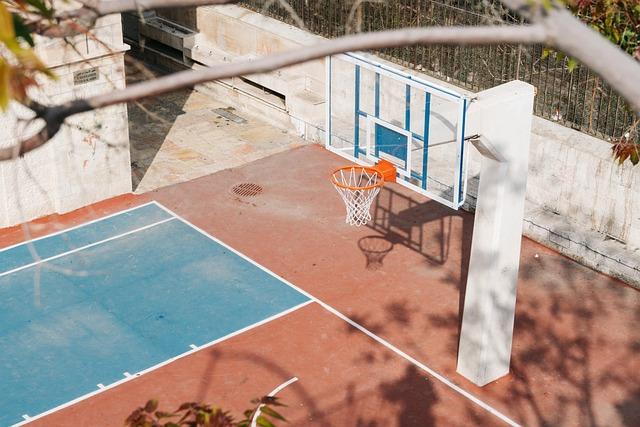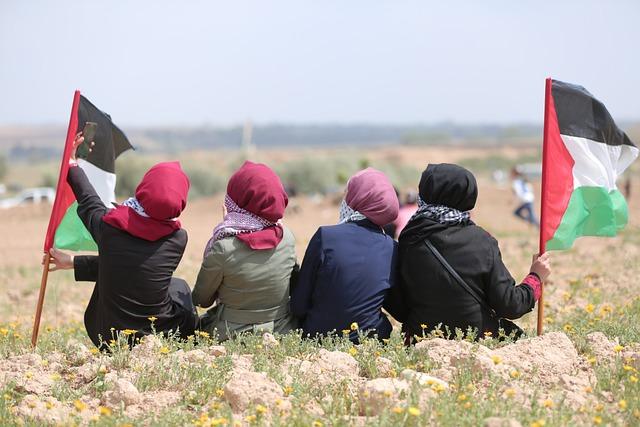In the realm of international basketball, the FIBA Asia Cup 2025 Qualifiers are capturing the attention of fans and analysts alike, wiht intense competitions fostering national pride and showcasing emerging talent. One of the most anticipated matchups in this thrilling qualifying round is the clash between Palestine and Jordan. As both teams prepare to take the court, the stakes couldn’t be higher. palestine seeks to assert its competitive spirit on the regional stage, while Jordan aims to leverage its established basketball prowess to secure a decisive victory. This encounter is not only pivotal for their respective qualification hopes but also serves as a testament to the growing popularity and influence of basketball in the Middle East. As the whistle prepares to blow for the first round of this rivalry, all eyes will be on the court, where athleticism, strategy, and national pride will collide in what promises to be an exciting chapter in FIBA’s storied history.
Palestine and Jordan: A Historical Rivalry in Basketball

The historical rivalry between Palestine and Jordan in basketball has deep roots, intertwined with cultural, political, and athletic narratives. This rivalry is not just a matter of sporting competition; it reflects the complexities of regional identity and pride. Over the decades,both nations have sought to assert their presence on the Asian basketball stage,fueled by passionate fans and a mutual desire for superiority. The FIBA Asia Cup 2025 Qualifiers serve as an significant battleground, where every match intensifies the rivalry and heightens national pride.
The teams approach each game with a sense of urgency and determination, aware of what is at stake. Key factors that define this rivalry include:
Historical Context: The shared yet fraught history of both nations influences player motivation.
Fan Engagement: Excited support from fans adds a vibrant atmosphere, turning matches into grand spectacles.
Player Development: Both nations invest in nurturing local talent, leading to fierce on-court competition.
As we watch the upcoming matches unfold, the tension and excitement will be palpable, showcasing not only the skills of the athletes but also the enduring spirit of their respective nations.
The Road to the FIBA Asia Cup 2025: Key Qualifying Factors

The FIBA Asia Cup 2025 qualifiers present a crucial opportunity for national teams to demonstrate their skill and strategic prowess. For Palestine and Jordan, the upcoming match is not just another game; it serves as a pivotal moment that could substantially impact their standings in the tournament. Key factors influencing their path include:
Player Fitness and Injury Management: The physical condition of the team members will play a critical role in their performance.
Team Synergy: Effective teamwork and chemistry among players can make a difference in high-pressure situations.
Coaching Strategies: Tactical decisions by coaches will determine how effectively teams can respond to their opponents’ strengths and weaknesses.
home-Court Advantage: The location of the match can influence player morale and crowd support.
As both teams prepare, analyzing past performances and honing their skills will be essential. Jordan, known for its strong offensive tactics, will need to capitalize on opportunities to score, while Palestine must fortify its defense to contain Jordan’s fast breaks. The potential roadblocks for both teams include:
Inconsistent Scoring: Reliance on a few key players to score can be detrimental if those players are neutralized.
Defensive Lapses: Any lapses in defense could lead to uncontested shots for the opponent.
Mental Fortitude: The psychological aspect of the game can greatly affect performance under pressure.
Tactical Analysis: How Palestine and Jordan Approach the Game

In the upcoming match against Jordan, Palestine is expected to employ a defensive strategy that emphasizes man-to-man coverage, aiming to limit Jordan’s scoring opportunities from both inside and beyond the arc. Their triumphant defensive tactics will hinge on the ability of their guards to effectively pressure ball handlers and disrupt offensive sets. Key to this approach will be the frontcourt players, who need to excel in rebounding and provide support by guarding the paint. Tactical versatility will allow Palestine to switch between a tight defensive formation and a zone defense, depending on the game flow, ensuring thay maximize their chances to regain possession.
Conversely, Jordan is likely to adopt a more offensive mindset, focusing on quick transitions and a perimeter-oriented attack. Utilizing their athletic players, Jordan will aim to push the ball up the court rapidly, seeking easy baskets before Palestine can set up its defense.Their offensive schemes often revolve around setting multiple screens for shooters and exploiting mismatches. This approach will be bolstered by the presence of dynamic playmakers who can navigate defenses effectively and create scoring opportunities, both for themselves and their teammates. To maintain their rhythm, Jordan will need to prioritize spacing and ball movement, ensuring they take advantage of any defensive lapses from palestine.
Player Spotlight: Stars to Watch in the qualifiers

The upcoming qualifiers for the FIBA Asia Cup 2025 will showcase a wealth of talent, with several key players expected to make a significant impact on the game between Palestine and Jordan. Fans will want to keep a close eye on Mohammed Hussein from Palestine, a versatile forward known for his defensive prowess and ability to hit critical shots under pressure. His experience on the international stage will be crucial as he leads the charge for his team. In contrast, Jordan’s Dar tucker stands out as a dynamic scoring guard. With his explosive athleticism and knack for creating plays, Tucker has the potential to change the momentum of the game at any moment.
Additionally, Jordan’s Ahmad Al Dwairi is another player to watch closely. The towering center provides not only rim protection but also contributes offensively with a variety of post moves. His rebounding ability will be essential against Palestine’s physical style of play.On the Palestinian side, Salah Al-Khaldi, a promising young talent, adds depth with his shooting ability and court vision. As both teams compete for a spot in the Asia Cup, these players will undoubtedly be pivotal in their respective strategies. Look for them to elevate their games and provide the excitement that fans anticipate in such a crucial match.
Fan Engagement and Support: The Role of Spectators in Basketball Rivalries

The intensity of basketball rivalries like Palestine vs Jordan transcends the court, fueled significantly by the passion and dedication of the spectators. Fans not only cheer for their teams but create an electrifying atmosphere that can sway the momentum of the game. During the FIBA Asia Cup 2025 Qualifiers, the energy radiating from the stands is palpable, as both teams draw strength from their supporters. The chants,banners,and unwavering loyalty transform basketball matches into communal experiences,fostering a sense of identity and pride among the local population.
Moreover, spectator engagement plays a crucial role in elevating the stakes of these rivalries. The rivalry between these nations is deeply rooted in historical and cultural contexts, and the fans’ involvement amplifies this significance.Key aspects of fan engagement include:
Social media Buzz: Fans often take to platforms to express their views, share match highlights, and rally fellow supporters.
Pre-Game Festivities: Tailgate parties and fan gatherings help build camaraderie before the action begins.
Merchandising: The sale of themed gear, from jerseys to flags, allows fans to showcase their loyalty while contributing to a vibrant visual spectacle.
Recommendations for Team Strategy and Preparation Ahead of the Match

To ensure a successful outing in the highly anticipated match against Jordan, Palestine’s coaching staff and players must focus on several critical strategies. Emphasizing defensive coordination could be paramount. Adopting a high-pressure defense will not only disrupt Jordan’s rhythm but also force turnovers that can lead to fast-break opportunities. Additionally, honing in on rebounding techniques will be crucial; Palestine must dominate the boards to limit Jordan’s second-chance points. The team should consider implementing these key components:
Strengthen team communication: Foster quick exchanges on the court to enhance defensive efficiency.
Study opponent’s gameplay: Analyze recent games to identify Jordan’s weaknesses and formulate specific counter-strategies.
Focus on transition plays: Utilize speed and agility to capitalize on fast-breaking situations.
Furthermore, preparing the players mentally and physically is as essential as strategic planning. Incorporating simulation drills that mimic the intensity of game scenarios can better equip the team for high-pressure moments. A well-structured pre-game conditioning regime will also play a significant role in ensuring that players maintain peak performance throughout the match. Some strategies to enhance overall preparation include:
Inviting veteran players to share insights: Experience can guide younger players through challenging situations.
Engaging in team-building exercises: Strengthening interpersonal relationships can lead to improved teamwork on the court.
Implementing mindfulness techniques: Promote mental focus through mindfulness exercises before the match.
Final Thoughts
As the curtains close on this thrilling first-round clash in the FIBA Asia Cup 2025 Qualifiers, the contest between Palestine and Jordan has underscored the growing competitive spirit in Asian basketball. Both teams showcased remarkable skill and determination, reflecting their ambitions on international stages.
Jordan’s experience and strategic prowess were evident, while Palestine displayed resilience and flair, marking a promising future for its basketball program. As the qualifiers continue, fans can look forward to more intense matchups, with each game serving as an opportunity for teams to solidify their places in the upcoming tournament.
As the journey to the FIBA Asia Cup progresses, both nations will undoubtedly draw on the lessons learned from this encounter, fueling their aspirations for success in the rounds to come. Stay tuned for further updates and insights as we move closer to the highly anticipated tournament in 2025.
Author : Asia-News
Publish date : 2025-02-22 04:07:00
Copyright for syndicated content belongs to the linked Source.